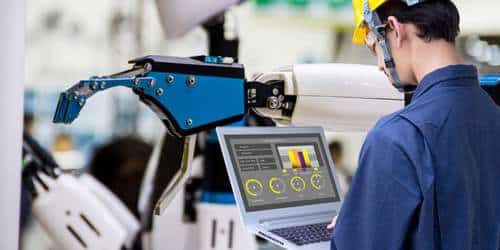The industry’s expanding competitiveness necessitates high-quality, reliable products at a reasonable price. To meet this problem, a variety of businesses are contemplating novel product designs and integrated manufacturing procedures, as well as the usage of automated devices. Industrial automation is a notable and influential effort toward finding answers to the aforementioned difficulty. In this article, we will get to discuss everything about industrial automation, including its examples, its importance, some good industrial automation companies, and also an industrial automation course you can take in case you want to venture into the field.
What is Industrial Automation?
The use of control systems, such as machines, actuators, sensors, processors, and networks, to accomplish activities with the purpose of automating production is known as industrial automation.
It began with basic conveyor belts moving parts through a manufacturing line. Machines performed fundamental duties and work, reducing the need for manual labor. This term nowadays encompasses a diverse set of machines, actuators, sensors, processors, and networks that work together to connect an industrial environment. Modern industrial automation is focusing on the best approach to leverage technology, from PLCs to AI, Machine Learning, and IIoT devices. The following will discuss industrial automation, its various varieties, and the benefits it provides to leading global industries, expanding markets, and evolving rivalry.
Types of Industrial Automation
From a conveyor belt to advanced AI and Machine Learning systems, it is critical to understand the many types of industrial automation in order to determine where each technology will be most beneficial. Not every solution or trend will be appropriate for your application or goals.
#1. Fixed Automation
Fixed automation frequently has a fixed task, continuous workflow, high volume manufacturing, and a high entrance barrier. This sort of industrial automation, often known as hard automation, rarely changes. A new product or a change in production is expensive and time-consuming. Programmable industrial automation will provide better benefits for lower volume or shorter product life cycles.
#2. Programmable Automation
Often connected with batch production, programmable automation is effective for producing hundreds to thousands of units. Because of the reduced manufacturing volume, there are more changeovers, which are taken into account when setting batch sizes and lead times. However, many businesses are concerned about increasing uptime and production. These objectives are leading to more adaptable automation.
#3. Flexible Automation
As it advances, procedures appear to entail less human contact and downtime while expanding the range of items produced on a single machine or production line. A CNC machine is an example of flexible automation that uses precise electromechanical controls. Changeovers can be done automatically, which reduces downtime. This works well for batch production, but it also allows for more on-demand production and more customisation.
#4. Integrated Automation
Integrating devices and equipment into a single control system integrates processes, production lines, and other elements. Integrated automation is a more comprehensive manufacturing strategy. As IIoT and Industry 4.0 progress, independent equipment and production lines can communicate over a network, allowing them to become more flexible and move toward on-demand manufacturing and higher customization.
Importance of Industrial Automation
Manufacturers, OEMs, and industrial operations can all benefit from industrial automation to improve operational efficiency. Industrial automation is critical for several reasons, including:
#1. Improve Worker Safety
To begin, industrial automation can relieve people of tedious, risky, and filthy activities. To promote a safer work environment, industrial automation can prevent injuries linked with repetitive motion and lifting goods. This initial effect can improve a worker’s day-to-day life while freeing them up for more difficult duties.
#2. Increase Productivity
Production is slowed by downtime, performance issues, and bottlenecks. These issues can be identified and handled before production slows down by using monitoring and automated devices interacting across a single platform. Data that provides predictive maintenance can help to decrease or eliminate downtime and performance issues. Real-time data can be used to identify root causes of problems, manage inventory, and monitor production speeds so that modifications can be made before bottlenecks emerge.
#3. Higher Quality
Connected automation devices improve repeatability and fidelity, collect data from practically everywhere on a production line, and deliver notifications to anybody with access. Early detection of quality changes can enhance productivity, minimize waste, reduce rework, and increase profit. Furthermore, automated systems capable of verifying and validating quality can increase transparency and ensure that items are made to fulfill a customer’s specifications before leaving the factory floor.
#4. Better Decision Making
Managers will be able to produce more accurate models to uncover new revenue sources and deliver better estimations to stakeholders as more devices are connected and managed with industrial automation solutions. Industrial automation technology can improve the ability to remotely monitor and operate numerous locations for a more comprehensive solution that helps expedite supply chain management, track assets in the field, and offer data to make better decisions.
#5. Cost savings
Using robots is just less expensive than employing human operators. The only costs after the original purchase of a robot are maintenance and the energy required during operation. When compared to operator pay and benefits, the cost reductions accumulate over time. Furthermore, robots enhance the process and improve quality, resulting in reduced waste and even more cost savings.
Examples of Industrial Automation
Some examples of industrial automation include:
#1. Machine Vision
Machine vision is a cutting-edge, imaging-based specialized automation inspection and analysis technology that manufacturers utilize to boost system productivity and output. The computerized robotic guidance system is utilized for a variety of manufacturing applications and activities on the production line. A camera or many camera sensors capture visual images of products in the system. The sensors analyze the images for visual examination before relaying the results to system operators for further analysis and action.
Machine vision technology is employed by numerous industries in the organization and control of day-to-day production processes, ranging from farming and fabrication to manufacturing and medical applications. Crops can be monitored for pest management and harvesting, assembly line processes and inventory control can be managed in real-time for product tracking and traceability to maintain regulatory compliance, and parts and products may be inspected for quality control.
#2. Robotic Picking, Sorting, and Packaging Solutions
Robotic automation in industrial processes is being employed for a wide range of diverse and sophisticated applications. Material handling automation considerably simplifies the picking, sorting, and packaging procedures on production lines and in fulfillment warehouses. Using industrial robotics in picking, sorting, and packaging processes increases operational efficiency, dependability, and production while reducing human error.
On assembly lines, automated machines sift, choose, and put parts and components. Warehouse automation solutions can track inventory movement from the time products are received to the time they are distributed. Bin tracking, cycle counting, order picking, sorting, packing, palletizing, and coding and labeling products for delivery can all benefit from automation.
#3. CNC Machine Automation
Though CNC (Computer Numerical Control) machining has been used since the 1940s, the integration of automation systems enables manufacturers to build parts and components with exact precision, speed, and repeatability in order to satisfy ever-increasing production demands. CNC machines are programmed to control a variety of machinery and instruments used in manufacturing processes, such as lathes, mills, drills, and routers. CNC machine processes, once automated, can use several tools to streamline manufacturing. With the addition of more 3D printing machines to factory floors, automated CNC machining has proven critical in the surface finishing of 3D printed products. CNC automation is a vital technology that can expand the capacity of manufacturing processes with speed and efficiency, whether for prototyping or large production.
Industrial Automation Companies
IA firms employ control systems to operate machines, which aid in the completion of a specific process. Labor utilization will be lowered by using automation machines. The following are the world’s top industrial automation companies:
#1. Siemens
Siemens is a pioneer in infrastructure and energy solutions, as well as industrial automation and software. The company delivers laboratory tests, medical imaging equipment, and clinical IT as one of the world’s largest producers of energy-efficient, resource-saving technology. Its technology aims to produce resource-efficient industries and resilient supply networks, as well as smarter buildings and grids, greener, more comfortable transportation, and enhanced healthcare. Siemens therefore enables its customers to alter their industries and markets.
#2. ABB
ABB, a leading technology firm, energizes societal and industrial transformation to build a more productive, sustainable future. This ABB elevates its customers’ performance by linking software to its electrification, robotics, automation, and motion portfolios. ABB serves over 100 countries and helps industries such as automotive, data centers, mining, and smart cities. The company makes robots and sells digitally connected and enabled industrial equipment and systems.
#3. Emerson
Emerson combines decades of technology and engineering expertise to create creative solutions for customers in the industrial, commercial, and residential markets. Emerson’s automation experts provide solutions for everything from projects to operations to help customers meet their goals and elevate their organizations into the top quartile.
#4. Rockwell Automation
Rockwell Automation is one of the world’s leading industrial automation firms. It is headquartered in Milwaukee and has offices in over 80 locations across the world. This firm specializes on architecture and software.
#5. Honeywell process solutions
Honeywell process solutions manufacture a wide range of commercial and consumer products. This American-based corporation provides aeronautical engineering services. For more than 40 years, it has pioneered process automation control, evolving from legacy process control systems to today’s leading innovations such as Experion® PKS, thereby protecting our customers’ investments in automation assets.
Industrial Automation Course to Take
There are numerous Industrial Automation Courses available. More precisely, in this area, we will concentrate on online industrial automation training. If you have a background in mechanical engineering or factory operations, I recommend looking into these automation courses for mechanical engineers:
LinkedIn Learning (previously Lynda) also has some excellent options for automation engineering and industrial automation courses. The advantage of this option is that once you complete a course, the certificate will appear on your LinkedIn profile.
#1. Electrical Automation Course
You should also consider taking an electrical automation course rather than merely an industrial course. If you want to work with an Industrial or Robotics Integrator, you need to be familiar with electrical systems.
Furthermore, experience with AC/DC motors and drives, as well as knowledge of Variable Frequency Drives (VFDs), is highly valued in most Controls Engineering positions.
#2. Take an Automation Technician Course or Training
If you’re new to industrial automation and don’t have an engineering background, you might choose to start by taking automation technician training or a course online.
Automation technician programs are available at several community colleges and technical trade institutions. So, if you know you’re not good at holding oneself accountable for online classes, you might want to think about enrolling in a training program in person.
#3. Free Online Industrial Automation Course
If you don’t have the option of taking professional development classes at work, free online automation courses are the best option.
Free courses will not provide you with the added benefit of a certificate. However, if the alternative is between knowing the content and not, I would take the free option every time.
Here are excellent free online industrial automation course:
You might also look for industrial automation tutorial course on YouTube. Here are a few tutorials I recommend you look into.
- Ladder Diagram Tutorials by Pete Vree
- PLC Manual
- RealPars
What are the 4 Types of Industrial Automation?
The four categories of industrial automation are as follows:
- Fixed Automation
- Programmable Automation
- Flexible Automation
- Integrated Automation.
What are the Two 2 Types of Industrial Automation?
Industrial Automation Types include:
- Fixed (Hard) Automation.
- Flexible (Soft) Automation
What are the 3 Major Systems used in Industrial Automation?
Industrial Automation System Types include:
- Fixed Automation.
- Programmable Automation.
- Flexible Automation.
What are 5 Examples of Automation?
Household thermostats controlling boilers, the first automatic telephone switchboards, electronic navigation systems, and the most advanced algorithms underlying self-driving cars are all examples.
What is PLC in Industrial Automation?
A PLC is a type of industrial computer that monitors inputs and outputs in order to make choices based on the program stored in the PLC’s memory. The usage of PLCs aids in the reduction of human decision-making processes in order to increase efficiency.
What are the Tools for Industrial Automation?
Tools for industrial automation include:
- Programmable Logic Controller (PLC)
- Supervisory Control and Data Acquisition (SCADA)
- Human Machine Interface (HMI)
- Artificial Neural Network (ANN)
- Distributed Control System (DCS)
- Robotics.
What are the Equipments of Industrial Automation?
Industrial Automation Equipment is a type of manufacturing equipment that is used to automate certain manufacturing processes. Industrial robots, automation cells, conveyors, and specific devices such as lifters and turn-over machines are examples of equipment.
Conclusion
Industrial automation has progressed much beyond simple conveyor belts. Knowing which form of automation to use and how it will assist the firm will keep you ahead of the competition. As more data becomes available, better managers will be able to identify where the largest benefits can be found and which Industry 4.0 technologies can boost production, quality, revenue streams, and workforce.
- INDUSTRIAL GOODS: Meaning, Characteristics, Types of Buyers
- BEST AUTOMATION MARKETING SOFTWARE: Features and Pricing
- Sales Automation: Meaning, Platforms & Benefits
- DEVELOPMENT BANKS: Beginners’ Guide with Examples (+Best picks)
- Industrial Insurance: Definition and Detailed Explanation
- WORK FLOW: Definition, Management, Software & Manager






